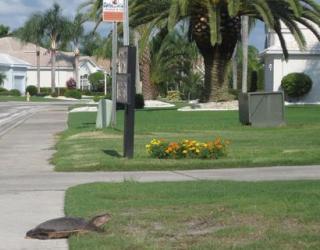|
Article Courtesy of The Tampa Tribune By Laura Cone Published July 6, 2012
Ed Barnes, the president of the Sun City Center Community Association board, said the board has forced a member's property into foreclosure and taken ownership after failed attempts to recover membership dues owed since 2008.
Barnes said he is hoping other delinquent homeowners in Sun City Center will take note that the CA does have the legal authority to, in some cases, take a member's home.
"They owe the dues," Barnes said. "I hope they take it seriously because we plan to do more of these. I hope it motivates people to pay their dues."
over one home and rented it for the last year. It's not just the CA, we can do that," Stephens said, adding they set the rent at about $1,000.
Stephens said because the bank still owns the property, the HOA attorneys were careful to disclose the situation in the rental agreement. The rental contract was subject to the bank settlement on the loan and the bank then taking over title of property.
In this case, the homeowner had abandoned the property.
"They just defaulted on all their fees for a long period," said Stephens. "Because of the rent, we have recovered most or maybe all the money owed to us. Part of the rent we had to pay to the CA because the person had defaulted on their CA as well." People who belong to Bayonne II HOA pay $375 quarterly. He said the fee covers lawn maintenance as well as cable.
In addition to the HOA, the homeowners there also pay an annual Renaissance Club membership of about $2,000 a year.
"We have an inspection group here as part of our board and we periodically go out and inspect the neighborhood," Stephens said. "We send letters to homeowners if we find them in default." Stephens said the fees may be high, but they are not kept hidden from people purchasing homes. "These people know when they move in; they are given a copy of the covenants," he said. "They are given everything before they close. We had some people, who apparently during this period of decline in home values, took out mortgages that became higher than the value of their house. We have had short sales here so people have lost some of their money."
Stephens said the banks are fairly slow when it comes to following up on foreclosures, which gives the HOA and CA a window to rent out properties. And, in this case, the HOA also did maintenance on the house.
"It's a win-win situation," he said. "The real loser is the homeowner who agreed to buy that property in the first place. Some of these people lose everything they put down. We are still surprised people at our age are even taking mortgages."
Barnes said the CA has put 127 liens out on houses in SCC.
"Some of them are in foreclosure; some of them the bank owns; some of them have run into difficulty," Barnes said. "Some of them we will work out payment plans with."
He said CA dues of $263 per member each year are due Jan. 31. The homeowner then receives four letters stating the fees are past due. The final of four letters is sent out May 1, stating the homeowner has 10 days to pay the dues or they will put a lien on the house.
"In May, we start the legal process," Barnes said. "Once they get the liens on their houses, they realize we mean business and start paying." |
